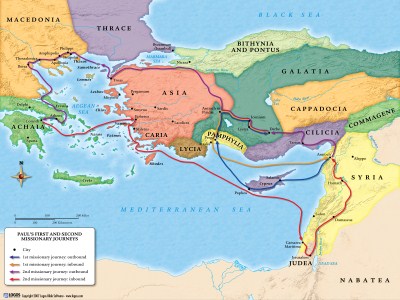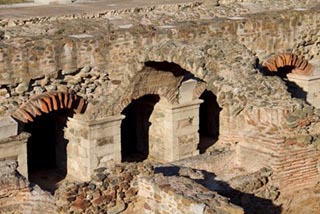3:1–5 Having offered prayers on behalf of the Thessalonian church earlier in the letter, Paul now requests the believers to pray for him. |
3:1 brothers The Greek word for “brothers,” adelphoi, can simultaneously address both male and female believers.
pray for us Even when asking for prayer, Paul considers the interests of Jesus Christ—that His message would rapidly spread and be honored.
 Prayers in Paul’s Letters Table
Prayers in Paul’s Letters Table
word of the Lord Refers to the gospel message (1 Thess 1:8; Acts 8:25; 15:35–36).
message (1 Thess 1:8; Acts 8:25; 15:35–36).
just as also it was with you The Thessalonians’ response to the gospel was exemplary (see 1 Thess 1:6–10).
3:2 evil and wicked people Those who opposed Paul and his companions during their missionary efforts—both Jew and Gentile (see Acts 18:12–13). Paul’s language echoes the prophet Isaiah. He may have been alluding to the Septuagint (the ancient Greek translation of the ot) of Isa 25:4, which includes the phrase “you will deliver them from wicked men.”
3:3 who will strengthen you God showed His faithfulness by preserving the Thessalonians while they were persecuted (1 Thess 3:6–9).
the evil one Refers to Satan, the enemy of God (see Matt 6:13; Eph 6:16). The promise that believers will be protected from Satan by the Lord may be an allusion to the Lord’s Prayer. See note on 1 Thess 2:18.
the enemy of God (see Matt 6:13; Eph 6:16). The promise that believers will be protected from Satan by the Lord may be an allusion to the Lord’s Prayer. See note on 1 Thess 2:18.
3:5 direct your hearts An expression from the ot (e.g., Prov 23:19; 2 Chr 20:33). Paul asks God to guide the hearts of the Thessalonians—the center of desire and purpose. See 1 Thess 3:13.
love of God The love that God has for believers (Rom 5:5; 2 Cor 13:13). God displayed his love through the sacrificial death of His Son, Jesus Christ.
that God has for believers (Rom 5:5; 2 Cor 13:13). God displayed his love through the sacrificial death of His Son, Jesus Christ.
patient endurance of Christ The patient endurance displayed by Christ in His own suffering. His example helps believers endure persecution.
3:6–15 Paul returns to another subject he addressed in his first letter to the Thessalonians: believers who refused to work and instead relied on financial support from other believers (1 Thess 5:14). Because these people ignored Paul’s previous instruction, he commands the rest of the church to avoid them (2 Thess 3:6, 14–15). He then appeals to the work ethic that he and his coworkers had demonstrated when they were visiting Thessalonica (vv. 7–10). Paul also directly addresses those refusing to work; he exhorts them to support themselves and not to damage the church’s reputation in society (v. 12). |
3:6 who lives irresponsibly Those who do not work, but take advantage of the charity of others (1 Thess 5:14).
the tradition Paul’s gospel message communicated in word and deed (see 1 Thess 2:8).
3:7 imitate us See note on 1 Thess 1:6.
we did not behave irresponsibly among you Paul and his companions worked to provide for their own needs while living with the Thessalonians, setting an example for them to follow. See 1 Thess 2:9 and note.
3:8 without paying Paul and his companions could have taken advantage of the hospitality of the Thessalonians. Instead, they left them with an example of self-sacrifice. Paul did not want to burden his churches with financial responsibility for his ministry. Compare 1 Cor 9:1–18.
toil and labor Greeks abhorred manual labor and considered it the duty of slaves. Paul did not see his work as a distraction from ministry, but as part of the ministry itself.
as a distraction from ministry, but as part of the ministry itself.
not to be a burden The socioeconomic status of believers in Thessalonica may have also motivated Paul to provide for himself.
3:9 that we do not have the right Paul did not use his status as an apostle to take advantage of people. He set aside his rights in order to teach the Thessalonians about hard work and sacrifice (compare 1 Cor 9:12, 15).
so that you may imitate us Paul lived in such a way that he could call others to imitate him (1 Cor 4:16; 11:1; Phil 4:9).
3:10 even when we were with you Paul and his companions visited Thessalonica during his second missionary journey (Acts 17:1–9).
Paul’s Second Missionary Journey (ad 49–51) |
Paul and Silas visit Lystra and Derbe |
Paul and Silas visit Philippi |
Paul and Silas visit Thessalonica |
Paul visits Athens |
Paul visits Corinth |
Paul writes letters from Corinth to the Thessalonian church |
does not want to work Believers may have stopped working out of expectations of the Lord’s imminent return or their own laziness. The early church had a lot of charity (compare Acts 6:1–7); some believers may have taken advantage of this.
3:11 busybodies Those who meddle in matters that don’t concern them.
3:12 we command and we exhort Paul is not offering advice. The health and witness of the church in Thessalonica is at stake.
bread Food.
3:14 letter Paul’s letters carried just as much authority as his personal presence with the believers. See 2 Cor 10:9–11.
that he may be put to shame In Graeco-Roman culture, shame was a powerful tool for motivating a person to realign his or her behavior with the community’s values. The believers in Thessalonica were already ostracized from the rest of the city’s population because they turned from idols to the Living God (1 Thess 1:9). Those who were shunned because of their disobedience were even further removed from community.
was a powerful tool for motivating a person to realign his or her behavior with the community’s values. The believers in Thessalonica were already ostracized from the rest of the city’s population because they turned from idols to the Living God (1 Thess 1:9). Those who were shunned because of their disobedience were even further removed from community.
3:15 admonish The Greek word used here, noutheteō, means to warn someone about the disastrous consequences of his or her actions. Paul regards this as the responsibility of the community. Likewise, Paul provides a model of church discipline that aims toward the restoration of the person, not condemnation.
3:16–18 Paul closes the letter with a benediction (2 Thess 3:16) and a note regarding his signature (v. 17). |
3:16 Lord of peace Compare note on 1 Thess 5:3.
3:17 The greeting is by my hand The need for a signature of authenticity may reflect an awareness of letters forged in Paul’s name (compare 2 Thess 2:2; 1 Cor 16:21; Col 4:18).
3:18 The grace of our Lord Jesus Christ Paul’s typical closing in his letters (Gal 6:18; Phil 4:23).

|
About Faithlife Study BibleFaithlife Study Bible (FSB) is your guide to the ancient world of the Old and New Testaments, with study notes and articles that draw from a wide range of academic research. FSB helps you learn how to think about interpretation methods and issues so that you can gain a deeper understanding of the text. |
| Copyright |
Copyright 2012 Logos Bible Software. |
| Support Info | fsb |
 Loading…
Loading…



